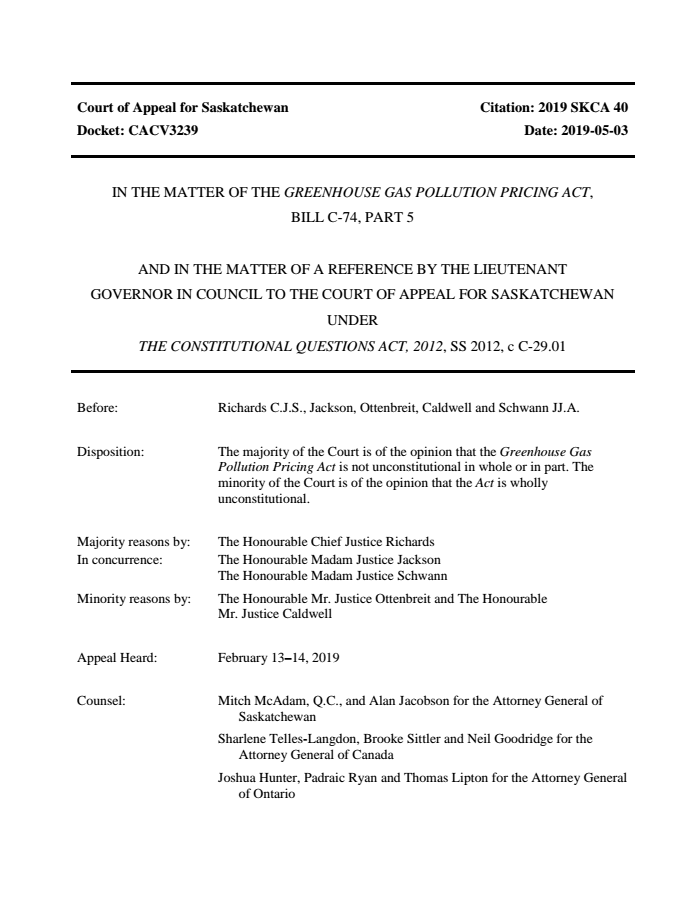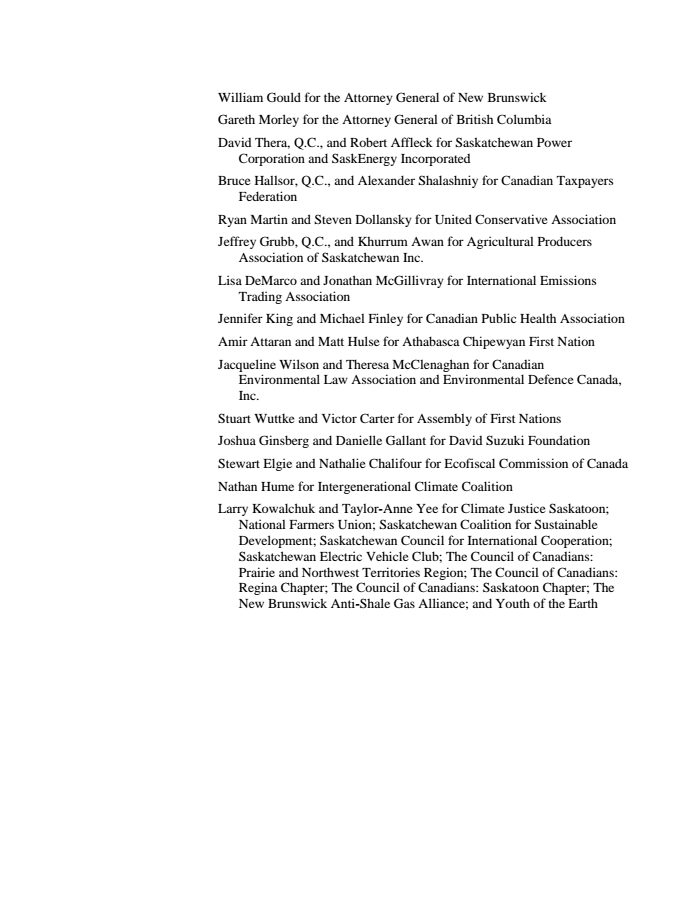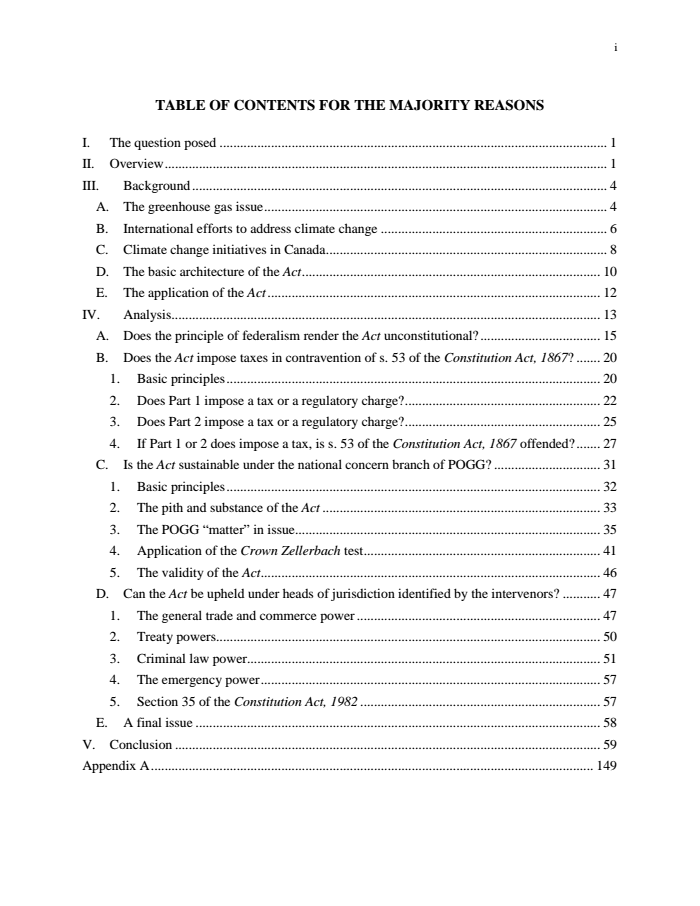Saskatchewan
Saskatchewan premier plans to appeal carbon tax decision to Supreme Court
Court rules 3-2 in favour of federal government; but dissenters say carbon tax wholly unconstitutional
THIS IS A WASTE OF TAXPAYERS MONEY, ALBERTA HAS THE BEST CARBON TAX WHICH IS PROVINCIALLY REDEEMABLE FOR 60% OF THE POPULATION
THIS LEGAL CHALLENGE WILL GO NOWHERE AS DID THE PROVINCES CHALLENGES TO THE FEDERAL GUN REGISTRY (EP)
THIS LEGAL CHALLENGE WILL GO NOWHERE AS DID THE PROVINCES CHALLENGES TO THE FEDERAL GUN REGISTRY (EP)
Saskatchewan's Court of Appeal ruled in favour of the federal government by a margin of 3-2 in a legal battle against the federal carbon tax. Saskatchewan Premier Scott Moe says the province will appeal to the Supreme Court of Canada. (Michael Bell/Canadian Press
Saskatchewan's Court of Appeal has ruled that the carbon tax imposed on the
province by the federal government is constitutionally sound and falls within the
legislative authority of Parliament. The ruling was released Friday.
Premier Scott Moe said the decision will be appealed to the Supreme Court of Canada. The province has about 30 days to appeal, according to Saskatchewan Attorney General Don Morgan. The provincial government would act as intervenor in other court challenges against the carbon tax.
"I remain hopeful for a different outcome," Moe said in the aftermath of the decision's release.
"No one in this nation should confuse climate action with a carbon tax."
Lawyers for the provincial government had argued the tax is unfair and unconstitutional. The 155-page decision was not unanimous. Three judges ruled in favour of the federal government while two ruled the law was wholly unconstitutional.
Justices Ralph Ottenbreit and Neal Caldwell were the dissenting opinions as they argued Part 1 of The Greenhouse Gas Pollution Pricing Act,which imposes a charge on greenhouse gas-producing fuels and waste, is invalid and an unconstitutional delegation of Parliament's law-making power.
Environment and Climate Change Minister Catherine McKenna speaks in the foyer of the House of Commons in Ottawa on Friday. McKenna called out political opponents of the carbon tax, challenging them to 'stop the partisan games and join in on serious and effective climate action.' (Adrian Wyld/The Canadian Press)
Moe said Saskatchewan, and the rest of Canada, will be able to have their say on the federal carbon tax when the next general election rolls around. He pointed out that the carbon tax became a hot button issue in recent provincial elections and will be a factor again in October.
"It was forced on the provinces across the nation ... by the prime minister of Canada," Moe said of the carbon tax. "The only effectiveness this tax has is ultimately moving jobs out of our jurisdiction into other areas of the world, and we won't stand for that."
Saskatchewan had introduced its own carbon plan, Prairie Resilience, but did not place a price on carbon. The federal government's carbon price starts at a minimum of $20 a tonne and is to rise $10 each year until 2022.
Federal Environment and Climate Change Minister Catherine McKenna praised the court's decision to uphold Ottawa's jurisdiction.
"It confirms that putting a price on carbon pollution and returning the revenues to Canadians through the Climate Action Incentive rebate is not only constitutional, it is an effective and essential part of any serious response to the global challenge of climate change," McKenna said in Ottawa on Friday.
McKenna challenged opponents of the carbon tax to "stop the partisan games and join in on serious and effective climate action." She re-emphasized the court's findings that a price on carbon is "an essential aspect or element of the global effort to limit GHG emissions."
Brett Dolter, an economics professor at the University of Regina, said the decision means the Saskatchewan government must now look at how it should modify its own made-in-Saskatchewan carbon reduction plan — whether it's similar to the federal plan, or offering rebate cheques, or moving the revenue to other sectors of government which could use the funding.
Watch CBC Saskatchewan's special coverage:
"The policy can be designed to ensure people don't fall behind. That's the message I want people to realize," said Dolter. "We often talk about carbon pricing as if it's just this cost — and we often forget about the money coming in that could offset this impact."
Ontario has also launched a court challenge against the carbon tax, which was implemented by the federal government on April 1 in provinces that did not have their own carbon pricing plan that satisfied criteria laid out by Ottawa.
Alberta Premier Jason Kenney said in a statement that the decision from the Saskatchewan court is "far from the broad victory the federal government sought."
Kenney also said Alberta would be joining Saskatchewan's case as it appeals it to the Supreme Court. Kenney touted his province's plan, which includes carbon-capture storage but does not mention phasing out coal. Alberta's plan instead looks at emissions targets that could force some coal plants to close or switch to a cleaner fuel to remain profitable.
"We believe that our strong plan makes a federal carbon tax redundant and that a consumer-punishing retail carbon tax — whether imposed by the NDP or by Justin Trudeau — is the wrong way to go. It's all economic pain and no environmental gain," Kenney's statement reads.
New Brunswick Premier Blaine Higgs said he's disappointed by the decision, and that the province would consult its attorney general to "determine the most effective means to continue our opposition."
"The unfair federal tax does not, and will not, work within the strategies developed in New Brunswick to address one of the most pressing issues of our times," he said in a statement.
Manitoba's Premier Brian Pallister has said his province will also launch its own court challenge.
There's also the possibility that the Supreme Court may not hear the case if courts in Saskatchewan, Ontario and Manitoba come to similar conclusions about the constitutionality of carbon pricing, according to experts.
Mobile users: View the document
(PDF KB)
(Text KB)CBC is not responsible for 3rd party content
(PDF KB)
(Text KB)CBC is not responsible for 3rd party content





No comments:
Post a Comment